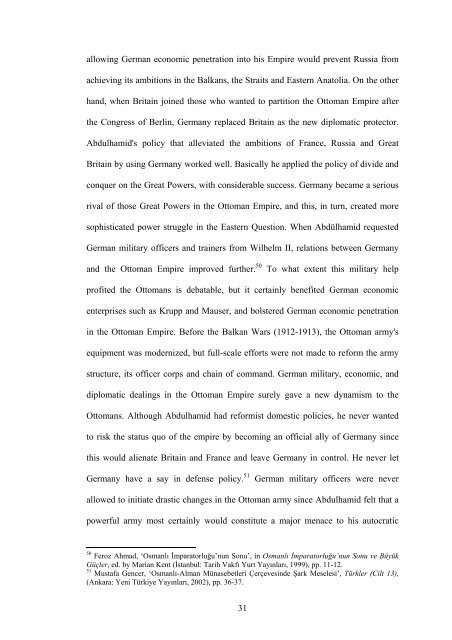the beginnings of ottoman-german partnership - Bilkent University
the beginnings of ottoman-german partnership - Bilkent University
the beginnings of ottoman-german partnership - Bilkent University
Create successful ePaper yourself
Turn your PDF publications into a flip-book with our unique Google optimized e-Paper software.
allowing German economic penetration into his Empire would prevent Russia from<br />
achieving its ambitions in <strong>the</strong> Balkans, <strong>the</strong> Straits and Eastern Anatolia. On <strong>the</strong> o<strong>the</strong>r<br />
hand, when Britain joined those who wanted to partition <strong>the</strong> Ottoman Empire after<br />
<strong>the</strong> Congress <strong>of</strong> Berlin, Germany replaced Britain as <strong>the</strong> new diplomatic protector.<br />
Abdulhamid's policy that alleviated <strong>the</strong> ambitions <strong>of</strong> France, Russia and Great<br />
Britain by using Germany worked well. Basically he applied <strong>the</strong> policy <strong>of</strong> divide and<br />
conquer on <strong>the</strong> Great Powers, with considerable success. Germany became a serious<br />
rival <strong>of</strong> those Great Powers in <strong>the</strong> Ottoman Empire, and this, in turn, created more<br />
sophisticated power struggle in <strong>the</strong> Eastern Question. When Abdülhamid requested<br />
German military <strong>of</strong>ficers and trainers from Wilhelm II, relations between Germany<br />
and <strong>the</strong> Ottoman Empire improved fur<strong>the</strong>r. 50 To what extent this military help<br />
pr<strong>of</strong>ited <strong>the</strong> Ottomans is debatable, but it certainly benefited German economic<br />
enterprises such as Krupp and Mauser, and bolstered German economic penetration<br />
in <strong>the</strong> Ottoman Empire. Before <strong>the</strong> Balkan Wars (1912-1913), <strong>the</strong> Ottoman army's<br />
equipment was modernized, but full-scale efforts were not made to reform <strong>the</strong> army<br />
structure, its <strong>of</strong>ficer corps and chain <strong>of</strong> command. German military, economic, and<br />
diplomatic dealings in <strong>the</strong> Ottoman Empire surely gave a new dynamism to <strong>the</strong><br />
Ottomans. Although Abdulhamid had reformist domestic policies, he never wanted<br />
to risk <strong>the</strong> status quo <strong>of</strong> <strong>the</strong> empire by becoming an <strong>of</strong>ficial ally <strong>of</strong> Germany since<br />
this would alienate Britain and France and leave Germany in control. He never let<br />
Germany have a say in defense policy. 51 German military <strong>of</strong>ficers were never<br />
allowed to initiate drastic changes in <strong>the</strong> Ottoman army since Abdulhamid felt that a<br />
powerful army most certainly would constitute a major menace to his autocratic<br />
50 Feroz Ahmad, ‘Osmanlı İmparatorluğu’nun Sonu’, in Osmanlı İmparatorluğu’nun Sonu ve Büyük<br />
Güçler, ed. by Marian Kent (İstanbul: Tarih Vakfı Yurt Yayınları, 1999), pp. 11-12.<br />
51 Mustafa Gencer, ‘Osmanlı-Alman Münasebetleri Çerçevesinde Şark Meselesi’, Türkler (Cilt 13),<br />
(Ankara: Yeni Türkiye Yayınları, 2002), pp. 36-37.<br />
31
















